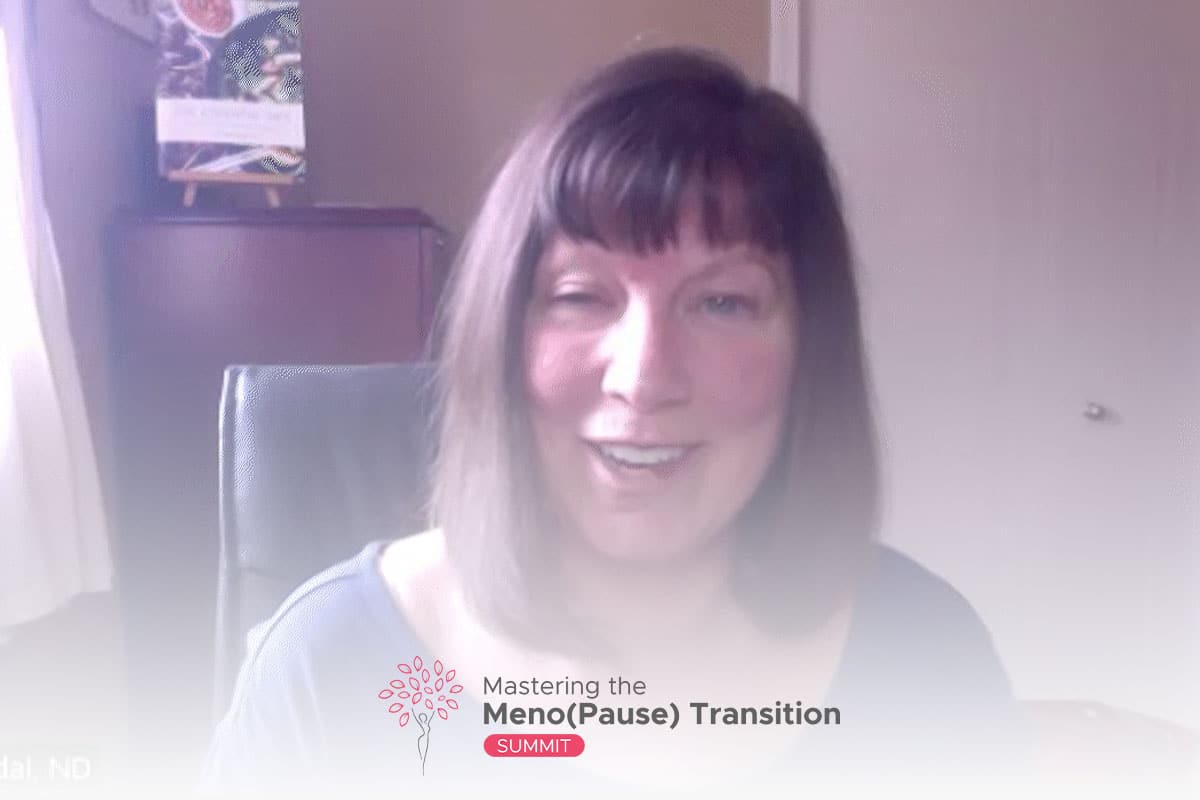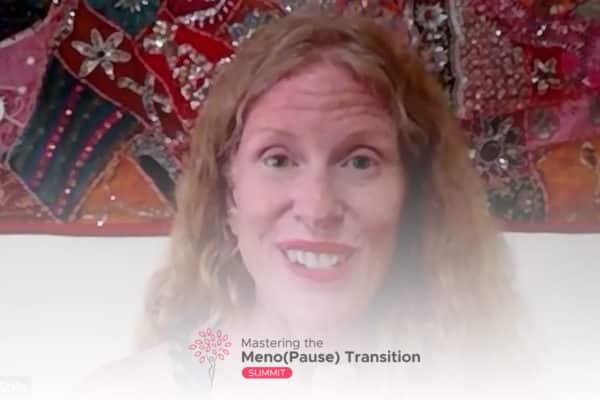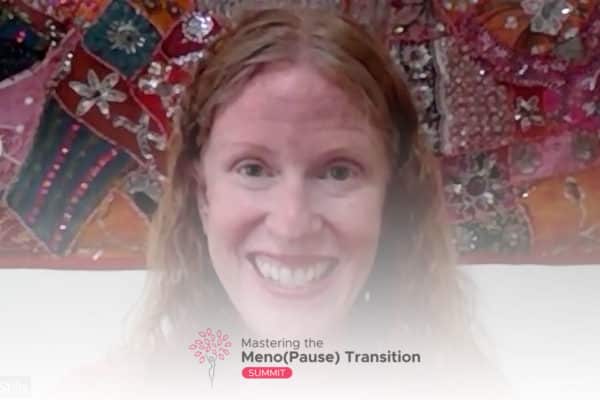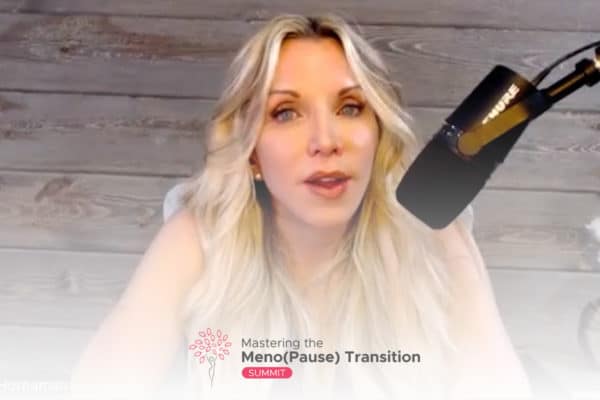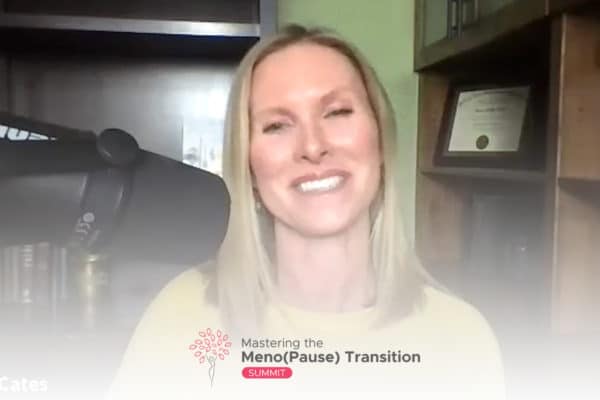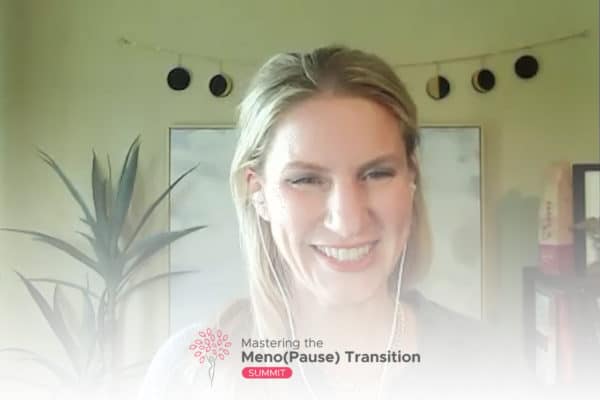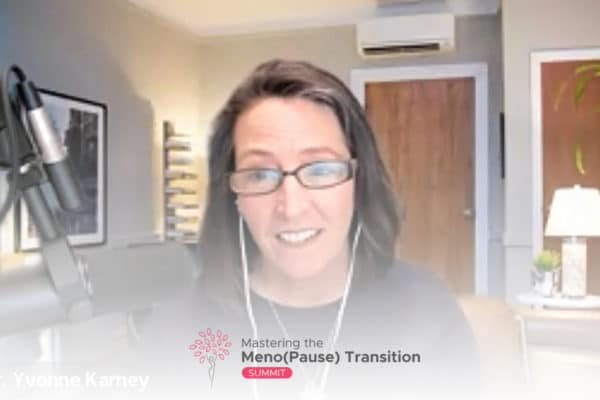Join the discussion below
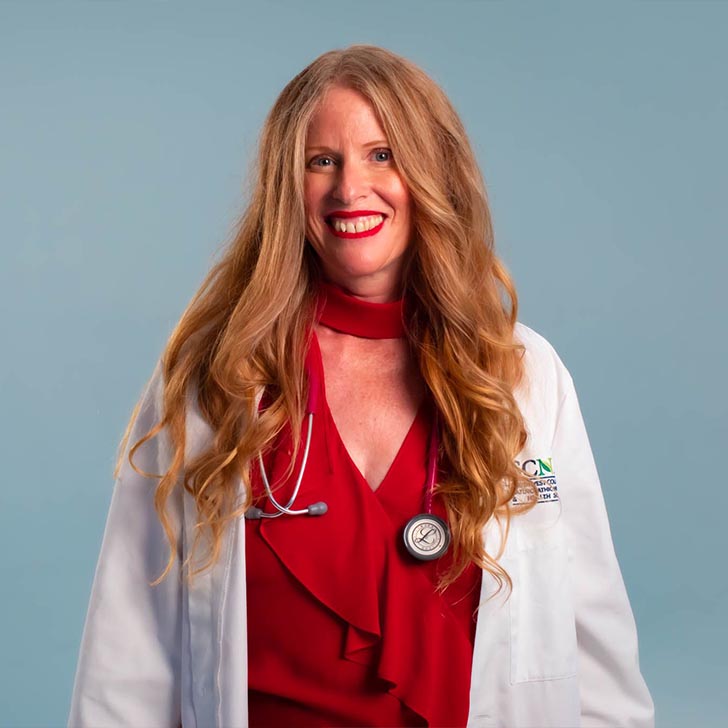
Dr. Sharon Stills, a licensed Naturopathic Medical Doctor with over two decades of dedicated service in transforming women’s health has been a guiding light for perimenopausal and menopausal women, empowering them to reinvent, explore, and rediscover their vitality and zest for life. Her pioneering RED Hot Sexy Meno(pause) Program encapsulates... Read More
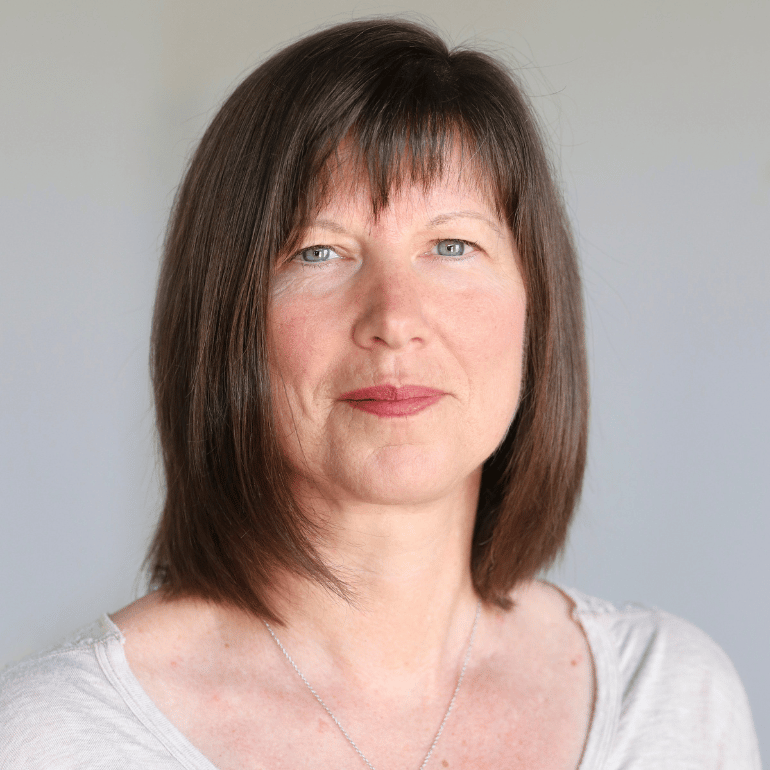
Christina Bjorndal, ND is considered an authority in the treatment of mental illnesses such as depression, anxiety, bipolar disorders and eating disorders using a physical, mental, emotional and spiritual approach. Having overcome many mental health challenges, Dr. Chris is a gifted speaker and writer and has shared her wellness philosophy... Read More
- The 4 areas to address when working with ones health
- What are the 3 macrosystems that need support during menopause?
- Managing you mind so you aren’t at the mercy of it
Related Topics
Adrenal Health, Detoxification, Hormonal Health, Immune System, Menopause, Mental Health, Neuroendocrine System, Womens HealthDr. Sharon Stills
Hi ladies, welcome back to “Mastering The Menopause Transition” summit. I’m your host, Dr. Sharon Stills, and I am excited that you’re back for yet another interesting, informative, educational conversation we’re gonna have today. I have one of my dear friends and a naturopathic colleague with me, Dr. Christina Bjorndal. I forgot to ask her how to pronounce her name. So hopefully I didn’t butcher it. And she, as I said, is another naturopathic physician. And she’s an authority in the treatment of mental illnesses, such as depression and anxiety and bipolar disorders and eating disorders. And these are things sometimes that we don’t feel comfortable talking about or don’t wanna talk about, but they’re an important conversation to have. So grab a cup of tea, grab your favorite blankie, settle in and give yourself this gift of having a really important intimate conversation between me and Dr. Bjorndal. So welcome to the summit. I’m so glad you’re here.
Christina Bjorndal, ND
Yeah. Thanks for having me. It’s great to be here with you.
Dr. Sharon Stills
Oh, my pleasure. So I always ask everyone to kinda start. Everyone has a story. I know you have a very powerful story and I’d love for you to share it with the listeners.
Christina Bjorndal, ND
It’s always hard to know where to start with that one, but generally I just share that I started off in high school for me with an eating disorder, but the interesting side note about that is the year before, I was treated with antibiotics for acne. And we know now that there’s a relationship between the gut microbiome and the brain and mental health. And I didn’t know that back then, but I’m happy for people that we’ve made these connections now. And I’d just like to mention that because a really important question is when did things start for you? And so if you’re listening to this and you have a daughter perhaps, or even you yourself have recently taken antibiotics, just make that connection that there is something to be addressed with respect to the gut microbiome.
So anyways, a little segue over there, we’ll come back to here. So I’ve always been an overachiever and this stems from, I think my childhood, I’m adopted. And so with that adoption piece came this imprinting within me that I kind of wasn’t wanted was the core beliefs that formed in me. Now what I did to compensate for that was become this overachiever person. And I carried that through until university and then I really crashed and burned. And I had a lot of anxiety. I found myself in the place of depression with suicidal ideations. I’d never experienced that before. So then I was prescribed antidepressants, which I took. And then a few months after that, I found myself in another place I’d never been before, which was basically not sleeping. And then I spun out of control into a delusional, manic, psychotic episode. And then that took six people to wrestle me into a straitjacket and off I went to the hospital and I was put in a rubber room and injected with a powerful antipsychotic. And then when I came back to reality, I was given the diagnosis of bipolar disorder type one. And I honestly did not know what to do with that. I really felt a lot of shame and a lot of stigma, didn’t understand what had happened to me. I felt like it was medication induced and if I hadn’t been on the medication, would that have happened? And so I pretty much disowned that part of myself that that’s not happening to me, thank you very much. And I marched through the world wearing this mask, again, that I’m okay on the outside, but I wasn’t doing very well on the inside. And graduated, was working. And then basically it all culminated in having a… I had a suicide attempt actually almost 27 years ago. to the day that we’re talking here, it’s in a couple weeks. But anyway, that was really the spiritual crisis for me. And it was a turning point where I had to figure out another way to navigate my life because medication upon medication upon medication wasn’t solving it for me. And so eventually I went to see a naturopathic doctor. So that’s my journey, sort of a longer meandering story there for you, but basically just have had a lot of struggles mental health wise, and that’s what then led me to make the career change to become a naturopathic doctor myself.
Dr. Sharon Stills
And so that your focus and practice now working with patients who have been given a diagnosis of bipolar or mental health disorders?
Christina Bjorndal, ND
Yeah.
Dr. Sharon Stills
That’s so important and so needed. So where do we start? I guess, so where do you start? What do you start addressing when looking at someone’s health? What are the common areas you look at?
Christina Bjorndal, ND
Well the first thing I like to people to understand is that there’s four overarching aspects to all of us. So we have the physical level, the mental, the emotional, and the spiritual. And if you can even just visualize that as sort of concentric circles, right on the outside, physical, mental, emotional, and spiritual at the center. And distortions can happen on any level. And it creates ripples throughout that whole system. But our medical system is focused mostly on that physical side. And I think if that’s all you’re gonna look at, then you’re gonna I think do a disservice to people because 75% of the puzzle lies in looking at the mental, emotional, spiritual realm. So that’s the one sort of really important piece that I like people to understand. I know for me, my healing started on the physical level as it does for many of us. But eventually that wasn’t enough. And then I had to look at my thoughts and my emotions and all of these other factors.
Dr. Sharon Stills
Exactly. And this is such an important topic for all of you listening, because a lot of times, as we’re going through our hormonal journey, we do start to feel anxious or depressed. Even if you don’t have an actual diagnoses, the things that we’re gonna talk about today are applicable to you and how you’re feeling. And I love the way you said how there are these circles and they all affect each other because that’s just such a good way to look at it. I always think that things usually start in a spiritual, emotional realm and they kind of come into our body. I have worked with patients who it was something that was just physical and so it’s really nice to think of it that way. I’m gonna think of it that way from now on where it’s just this line and it’s rippling and affecting everyone. So thanks for the visual. And also I just wanna say from your story and for anyone listening, you’re living proof and such an inspiration that even at our lowest of times, we can find help and we can rebound and be a vibrant being just like you are. So I just honor you for that, that’s quite a journey.
Christina Bjorndal, ND
Yes. Thank you. That piece was really challenging because I mentioned, and I know I’m not supposed to joke about suicide, but I mentioned I’m an overachiever and so I overachieved in that area too, but it didn’t work. And so I was like, what the hell? Why am I still here? And I had to reconcile that within myself and this might be getting too woo woo for people. But one of the things for me how I made sense of that, because it really didn’t make sense according to all the nephrologists and I had kidney failure. I mean all of the doctors, it did not make sense. Why is this person still here? And I think for me, I think we all come with lessons that we’re here to learn on a spiritual or a soul level and it may be forgiveness, it may be compassion. For me, I think it’s really just learning to love and accept myself. And I may have not been able to do that. And perhaps if there’s such a thing as previous lives. So this lifetime is about not succumbing to suicide and it’s been hard because I have spent a lot of days in darkness. But anyway, yes I am here. Thank you, and you’re right. I often say to people, look, suicide is a permanent decision or a permanent step to a temporary situation. The state that you might be if you’re listening to this and you’ve been struggling, it is temporary. Trust me, it is temporary. It will pass.
Dr. Sharon Stills
And so I hope this is not too personal the question to ask, but do you ever have suicidal thoughts still? Is it something that you feel like you have to constantly be in conversation with throughout your life? Or have you really put that behind you in doing the things you’ve done through naturopathic medicine, do you feel like that’s the past and not an issue anymore?
Christina Bjorndal, ND
Up until last September, if you had asked me that question last August, I would’ve said, yeah, it’s behind me and doesn’t happen. But going through menopause now, I had a depressive episode and it’s interesting because my first go to was not to think it was my hormones. And I tell women this all the time that are my age, it’s your hormones, it’s not neurotransmitter based, it’s your hormones. But even with myself, I didn’t go there. It was so interesting. So I did have some thoughts come my way, but it’s what I do with them now. I don’t attach to them and I don’t follow them and I don’t let one thought lead into another. I recognize them and then I refrain from following them any further. And it’s a core wound I think within me. So it’s something that’s very deep and hopefully it won’t come again. But if it does, it’s not scary for me. I don’t entertain it if that makes sense.
Dr. Sharon Stills
Gives a lot of hope. So speaking about menopause. What did you do for yourself and what do you do for your patients? Are there these macrosystems as you call them that you support during menopause? I’d love to hear you talk a little bit about that.
Christina Bjorndal, ND
So with any health condition, whether we’re talking mental health or we’re talking menopause or hormones or whatever, thyroid, whatever it might be, we just wanna first understand that there is, on that physical, level three macrosystems in the body. So there is the neurotransmitters and then the hormonal, the neuroendocrine system, and then the organs of detoxification and our immune system. And I find, and I’m curious too if you find this as well, that women who have supported themselves from a stress perspective, adrenal health perspective in their 20s and 30s and 40s do better in menopause than the ones that don’t, and I’m kind of laughing because I’m thinking, well, how many of us are actually supporting ourselves in our 20s, in our 30s, in our 40s? But the more that we can and that’s why this is so important for people to know that the self-care practices that are often talked about, they’re really important. Really important.
Dr. Sharon Stills
Yes, amen. I was laughing too because I was one of those lucky women just because of my career and the position I was in, I totally trashed my adrenals in my 20s, but in my 30s, I got on board. And so I was able to go through my transition without ever having a hot flash and really beautifully and peacefully because I had, I call it pre-gaming, I pre-gamed my hormonal journey. And so yes, if you are watching this and you know women who aren’t thinking about, that’s why I’m like it’s the menopause transition because this is for perimenopausal women, this is for women of all ages. Because if you listen to this now in your 20s and you just hear what we just talked about, what a gift you’re giving yourself down the road. So it really is a lifetime of learning to love ourselves, care for ourselves. And the earlier we start, the better it is.
Christina Bjorndal, ND
Yeah, absolutely. And I think the other piece of that puzzle is that any symptom that we may experience… I think our society accepts that there’s going to be symptoms and that menopause is a medical condition if you will. And it’s just not. And as you just said, you can transition seamlessly, effortlessly, sail through it no problem. And even for me, I had that mood dip, but there were other things going on at that time too. But then I’ve had some, mostly just was experiencing some night sweats for just about two or three weeks before I was… You sort of think each night, is this gonna happen again? Or was that a one off? Did that really happen? So then after a couple weeks I’m like, okay, I think I’d better get on this. So I started a little bit of Bezwecken, they have something called Phyto-B, which is a little bit of a bioidentical little formula. So I just started using that and night sweats went away like literally the next day it was so.
Dr. Sharon Stills
Bye bye night sweats. So I love that you mentioned, what would you like to share about because we talk a lot about hormones obviously. We don’t talk as much about neurotransmitters and we certainly don’t talk as much as a culture about the eliminatory organs and the immune system. So what would you like to share about those pieces?
Christina Bjorndal, ND
So the main organs of detoxification are your liver, your kidneys, your colon, your lungs, your skin, your lymphatic system. And we wanna understand that it’s one thing to be making the hormones and the neurotransmitters, but it’s another thing to get rid of them. And estrogen in particular, some gets broken down into metabolites and I won’t go too far into the science side of things, but just understand that your liver and your kidneys work really hard to get these metabolites or get these hormones broken down into metabolites so that your body can get rid of them through either the colon or the urine. But what could happen in the colon is if you don’t eliminate regularly or you’re not having a bowel movement ideally twice a day, then there’s an enzyme or a bacteria in the large intestine that can basically deconjugate or break down, again, these hormones that your body’s trying to get rid of, and then you reabsorb them. So there’s something called beta glucuronidase.
These things we wanna take a look at because if you’re not going to the bathroom, and I know a lot of people don’t like to talk about this, but it’s such an important thing. And for me, goodness me, being on… So at one point I was on five psychotropic meds and I can tell you, I was not going very often to the bathroom, which is not healthy, so not healthy, but I didn’t know anything about health. And so I didn’t know any better. And I think a lot of people, again, they’re taking all these medications and they don’t realize that it’s impacting these other systems in the body, which is in fact impacting your overall health systemically.
Dr. Sharon Stills
See, I needed another naturopath to come on so we could have the poop conversation. It’s so funny. Naturopathic doctors, we’re known, we’ll just be at dinner talking about our poop and we don’t think anything of it. And then you have someone like, are you really talking about that? But it is so important. And I’m sure you’ve seen it too in your years of practice where a patient will come in and say, oh yeah, I go, I don’t go every day, but I go regularly. And I’ve learned over the years that I need to define, could you please define what regularly is for me? And it’s like, I go every other Saturday. I go twice a month regularly. And we’ve been taught that that’s okay. And so here’s our poop message. You have to be going to the bathroom. You have to be moving your bowels. And we accept once a day.
We think if you go once a day, but optimally, I always go back to nursing babies, when you’re nursing a baby, they’re suckling at your breast. And they’re always pooping while they’re eating, because it’s the stimulus of taking food in and eliminating. So optimally, if you’re eating two meals a day, two bowel movements a day. And so that’s really important if you’re listening and you don’t have regular bowel movements to connect with your healthcare practitioner or find a new healthcare practitioner if you have one who didn’t already bring this up and make sure you’re looking at why you’re not going to the bathroom. And like Dr. Christina says, often meds can be a cause, it can be a side effect, but there can be so many other reasons from dehydration to magnesium deficiencies to thyroid issues and so on and so forth. So thank you thank you for bringing that up.
Christina Bjorndal, ND
And I just mentioned to you, a lot of people will say that they’re regular, but they’re drinking a lot of coffee. So that’s assisted, right? So the dehydration piece is huge. So many people don’t realize, the minimum amount of water is half your body weight in ounces. So half your body weight in pounds. And so honestly, I rarely see a patient drinking the right amount of water, the minimum amount.
Dr. Sharon Stills
It’s an epidemic. And if you haven’t checked out the interview with Gina Bria on the summit, make sure you do because she is the water queen. She is the hydration foundation. And so we dive deep into the importance of hydration because you can’t heal, you can’t have a happy hormone transition if you’re not properly hydrated. So super important. Absolutely. And so we talked about the colon and dehydration, the kidneys. How about the lymph system? That’s one of my favorites.
Christina Bjorndal, ND
Just one little thing I’ll mention too about the colon, a simple test people can do, again, ideally yes , going to the bathroom if you’re eating two meals a day, then you have two bowel movements, but also there’s the transit time, which is how long it’s taking for the food to transition through your body. And you can do a beet test, that’s where you have to eat a good, say two or three medium sized size beets. And then you time how long it takes for you to notice that red color in your stool. And that can give you an idea as to the transit time because you could still be going twice a day, but your transit time might also be slow. And because there’s so much, so many baseball field or football field of intestines within us, it’s got a long journey to go through. So anyway, I just found that also helpful for myself and I would say that there’s just so many things. Naturopathic doctors are always really focused on the liver and the colon and getting these organs of detoxification.
Dr. Sharon Stills
I take the transit time all the time. I’m glad you brought that up. That is an important something you ladies can do at home. And where do you like to see their transit time so how they know if they get a good result?
Christina Bjorndal, ND
I’m gonna say in that 12 to 18 hours.
Dr. Sharon Stills
Because there’s also the flip side of not going and then there’s the flip side of you have diarrhea and your transit time is too quick and you don’t even have time to absorb anything. So that’s a great test, safe test you can do at home just to see where you’re at.
Christina Bjorndal, ND
So now we got you working on your water, cutting down your coffee, eating beets. Next, lymphatic system. So the lymphatic system, it’s sort of an unsung hero, I guess, if you will, in the body and it doesn’t get a lot of lip service or discussion around it, but it’s basically, and I’m not even gonna do it a great service by calling it this, but it’s kind of like a garbage dump of the body. So it’s where we really wanna make sure that your lymphatic system is moving and flowing. And so a good thing you can do there if you’re not already doing something to support your lymphatic system is dry skin brushing. And the key here is dry. So we want to, before you have a shower, you can buy a dry skin brush. And you’re just going to, you know, you start at your ankles and you move up your inner thigh and outer thigh, your inner arms and up your abdomen, always towards your heart. You’ve got some main areas here in your clavicle area where there’s sort of major… I don’t know how to say it really properly, but I just call it dumps if you will.
Dr. Sharon Stills
Major lymphatic duct there that’s bringing everything together, draining down from the head, exactly. So yeah, it is the unsung hero of the body. I always think about in traditional mainstream medicine, there’s a pulmonologist, there’s a gastroenterologist, there’s a cardiologist, and why don’t they have a lymphologist? They just have totally disregarded one of the most important systems because if your lymph isn’t moving, you’re not detoxing and you’re moving towards disease rather than towards health. And yes, that was a great point you brought up too about the coffee that we want bowel movements on our own, not with an assist from caffeine. Do you take your patients off of coffee or what’s your thoughts on coffee?
Christina Bjorndal, ND
I’m not a big fan actually of it. So I’m always looking at where they are and seeing if I can move it down. Generally I just find our society is pretty attached to coffee. So often I’ll say, okay, well maximum one cup, but it’s also what are you putting in it? Are you putting in sugar? We don’t wanna be doing that. And the source of the beans too is important. I’ve read that there can be mold in a lot of the coffee beans. So I personally don’t drink coffee. I was always saving it to use it as a drug so that I could stay up and pull an all nighter to write an exam or something like that. So I never really got into it. But anyway, also I think definitely yes, if you have anxiety or depression, I do try to, mostly anxiety. With depression sometimes because people are struggling to get going, struggling to have motivation, get out of bed, just really struggling, oftentimes I don’t wanna take the coffee because it is something that does help them until we can get things balanced and restored. And then we can look at taking that crutch away.
Dr. Sharon Stills
I think coffee’s one of the highest sprayed crops. And so if you are indulging in coffee, you wanna make sure it’s organic or bulletproof or it’s a clean brand that’s not sprayed, that’s not growing microtoxins, exactly. So what about neurotransmitters? What do you have to say about them? Because they’re definitely the unsung heroes as well. We talk about hormones and we don’t talk about the neurotransmitters as often as I’d like to see the conversation in society.
Christina Bjorndal, ND
So there’s sort of two groups of neurotransmitters, inhibitory and excitatory, and with mental health or with depression, which is the most, well, I guess it’s arguable which one’s more prominent, depression or anxiety, but they’re both high with the level of people who are suffering. But generally speaking serotonin is one of the more common inhibitory neurotransmitters that’s mentioned. And there’s a whole class of medications dedicated to raising serotonin levels in the body, that those are called SSRIs, selective serotonin reuptake inhibitors. And what I really want people to understand is that serotonin is derived from an amino acid, an essential amino acid called tryptophan. So this is important because my own case I was on and off these SSRI medications for about 15 years, actually had recently been prescribed an SSRI shortly prior to my suicide attempt. And so if you are a clinician listening to this and you put somebody on an SSRI, please be following up with them within the first three months because it can increase suicidality in people. And that happened to me and I know it happens to lots of people.
So not saying never to take the medications, but I’m just saying follow up with your patients. But the thing is we always talk about a naturopathic medicine addressing the root of the problem. And so if tryptophan is the essential amino acid that then gets converted to 5-HTP and then to serotonin, why are we not then looking at that first? And in my own case, I was deficient. When I analyzed my diet, I was deficient in tryptophan. I wasn’t eating it because I was a vegetarian at that time and I didn’t have a very good diet, even though I was a vegetarian, I was mostly a carbotarian, wasn’t a lot of vegetables to be found in my diet. Hence the bowel movement problem. But nobody ever asked me what I was eating. So super important to understand. And dopamine is another really important neurotransmitter that’s involved in, often with ADHD, anything to do with addictions whether your addiction is from cocaine to heroin to overexercising. Dopamine is another really important neurotransmitter that we’re all needing, especially with these devices that a lot of us are using, every time you get a ding, that’s a dopamine hit.
Dr. Sharon Stills
When you’re saying addictions, and you’re saying overexercising, I’m singing my brain to Facebook, to Instagram. They can very easily be an addiction.
Christina Bjorndal, ND
They’re totally addictions. And these people that engineer these things, they’re not missing anything upstairs. They want you to be addicted to their product.
Dr. Sharon Stills
What was that? There was a documentary on Netflix, was it called “The Social Experiment”, yeah. If you haven’t seen that, I highly recommend watching it. It kind of is creepy but it really shows you how the people who are engineering it are really thinking and they’re doing it to make you addicted and take you out of your life and into this online addiction. It’s kinda scary.
Christina Bjorndal, ND
It’s very scary. I think it was called “The Social Dilemma”.
Dr. Sharon Stills
“The Social Dilemma”, yes, I think that’s what I was called too.
Christina Bjorndal, ND
So I kind of went on a tangent there, but basically the key thing to understand is a lot of the neurotransmitters or the majority of the neurotransmitters are derived from essential amino acids. And the key thing with these is we can’t make them within the body, you gotta get it from your diet. And if you’re not, or you’re not getting enough, then you may not be making these neurotransmitters. And it’s not a slam dunk that say I eat tryptophan-forming foods, I’m gonna go to serotonin. Because when tryptophan comes in the body, it’s first and foremost gonna be converted to something called vitamin B3 or niacin, because that’s used in every single cell of our body to produce what’s called adenosine triphosphate or ATP, which is the energy currency that every cell needs. So it’s more important to keep your heart beating and your lungs breathing than it is for you to feel good. And the other fly in the ointment with tryptophan is if you’re under a lot of stress, there’s another pathway in the body, it can go down and that you produce something called quinolinic acid and then you get more depressed because you’re never getting to serotonin. So it’s quite complicated, but it’s also so solvable.
Dr. Sharon Stills
I’m sure there are women listening who are on antidepressants and obviously you don’t wanna tell someone to just stop their medication, but what words of wisdom or advice do you have for the women who are listening who maybe are on an antidepressant or thinking about going on one?
Christina Bjorndal, ND
Well, if you’re on one already, then first and foremost, how are you doing? Are you feeling better on it? And if you are, then that’s telling us something, that’s telling us then that medication is perhaps helping. But the other thing is why did you go on it in the first place? And how long have you been on it? Because sometimes we go on these things for certain situations and then when we feel better, we just never go off of it. But yet our circumstances have changed. And so maybe you’ll be okay to do a slow taper. And the keyword there is slow taper. And whenever you do taper, you wanna build in these nutritional co-factors that support that pathway of the tryptophan pathway. And I always refer to it as bridging the gap. So we always wanna build in this extra support so that when you’re weaning off, you still have something there to support you in the production of these neurotransmitters.
And it’s also really important to ask, as I said, like what was going on initially, but what stage of your life? Because if you are, again, if it’s in menopause, then where your hormones are looked at. Is it really the right macrosystem? Because generally, if you started antidepressant, you should feel better. If you don’t, it tells you a couple of things. It tells you that it’s the wrong neurotransmitter that you’re supporting, or you could have something blocking the receptor. We look at things like the environment in terms of there can be chemicals from the environment that you might be making things, but they can’t get in the door or it could be the wrong macrosystem.
As we were just saying, it could be your hormones and not your neurotransmitters. And then if you’re the person who isn’t feeling that great, is thinking about going on one, then I would always start with a monitoring form to get a sense of the depth and the degree of your depression. And depending on where you score or lie objectively, then that dictates, you know, perhaps you could start with the naturopathic support because a lot of these things that we do make a big difference and you might not need this heavy hitter, this really big hammer over here of the medication. I’m not saying not to take it, but just assess whether you really need it. And could you start with some of the changes that one of us would suggest and see what happens? And that’s still available to you.
Dr. Sharon Stills
Exactly, exactly. I love that you said first, how are you doing? It just made me reflect on my clinical career. And I have never had to prescribe an antidepressant because I always use all the things that you’re talking about and get good results. But I’ve had patients come in on antidepressants and more often than not when they’re coming in, they’re not feeling good. But once I had a patient who came in and she was feeling good and I didn’t take her off of it because it was working for her. And so it’s really important to always remember what you said, like how are you doing? How’s it working for you? We get so attached sometimes to belief systems or can become very zealous.
And ultimately we want what’s working for you. And sometimes if a medication is working, it might be the answer for that moment. But I think both of us would agree it shouldn’t usually be your first step. There are many other things that can be looked at that are actually gonna get to the root cause. So you said something before and I kind of wanna go back to it. I’m gonna shift gears a little, but you said you manage your mind now and you manage your thoughts now. And I’m curious if you have any examples or solutions or advice for the ladies listening because I’m sure a lot of women were going, oh, that’s amazing, but how does she do it?
Christina Bjorndal, ND
So what I’ll do is I’ll just preface how remember I mentioned, so there’s those three macrosystems and that’s my job I think to figure out which of the macrosystems I need to support in you, if not all of them or maybe it’s just one, in my case, it was all three. And then the way I support you in health is the foundation of health is nutrition, right? We’re wanting to make sure we’re eating to support our hormones and our neurotransmitters. And then sleep and exercise are also very underrated, but yet super important in health. And a lot of us are sacrificing sleep and also exercise is the first thing to go when we’re busy, right? It’s like, oh, I don’t have time for that today. But then the next area is looking at managing stress, which includes looking at your thoughts. And other areas include how you manage your emotions and how you behave and react in the world and the environment. And ultimately wrapping everything up in love and compassion for you because at the end of the day, I think it all comes down to that. So that is a key question that I ask is on a scale of one to 10, how much do you love yourself?
And again, very rare for me to get an answer over five. And part of the problem is because if you’re struggling with mental health, many, well I’m gonna say all, patients have an inner critic. So it’s this voice in the head that keeps talking and talking and we’re completely immersed in this voice and we listen to it, but yet is beating us up, telling us you’re not doing it good enough, you’re not smart enough, you’re not pretty enough. You’re not whatever, fill in the blank, enough. And it just beats us down. And I know in my case with every depressive episode, every suicide attempt, it has been because the inner critic has the stage. And so how to manage that. So the first thing I learned is this process called… it’s called somewhere between the four Rs and the seven Rs depending on the day when I explain it. So today, if you have my book, which is called “Beyond The Label”, it’s called the seven Rs. But just when I do talks, it’s just shorter to keep it the five Rs. We’ll get to through as many as we can.
But basically the first step basically is to recognize, again, what is the nature of the thoughts, and ask the question, is this serving me or sabotaging me? Is this hurting me or helping me? Is it the inner critic or the inner cheerleader? The inner inner bully or the inner buddy? Ultimately, is it the ego or the soul? Is it based in fear or based in love ? And scientifically, is it sympathetic or parasympathetic? Is it moving me into stress or is it helping me relax? So what side are you on? And if you’re on a sympathetic side, which a lot of people are in this sort of stressed, heightened state, the unfortunate thing is some functions in the body like digestion, which we’re all big about in naturopathic medicine, it doesn’t happen as properly as it could because digestion is a parasympathetic process. Hence coming back to the poop. If you’re in a sympathetic state, you’re not gonna have a bowel movement because you need to be relaxed. So first step, it’s almost like you’re taking the thought out of your head and you’re looking at it.
And you’re asking the question, is this helping me to think this right now? And if not, then let’s refrain. That’s the second R, refrain from following it. And the way you do that, refrain by relaxing into the body, into the breath. So we wanna get into the present moment. A lot of people are living in the past or they’re living in the future. Especially anxiety is very much a future based place. And people are living there in a catastrophic worrisome way. And they’re fortune telling in a negative way, and life is gonna be over. And especially during this whole pandemic, it’s been such a testament to the fact of pushing people into fear and worry instead of saying it, anyway, I won’t go too far on that tangent. So when you relax into the breath, we can just do this together. So you just put your right hand on your belly button and your left hand on your heart, and you plant your feet on the floor. This connects yin and yang positions in you and chakra positions. I won’t go into the explanations, but just know that.
And also illustrating that there’s this gut brain relationship and more serotonin receptors between these two hands than there is in your brain, which is one of the reasons why people gain weight when they go on an antidepressant. Also there’s more electrical activity happening in your heart than there is in your brain. I also think with mental health, a lot of times we’re focusing I think on the wrong thing, we’re focusing on the brain and how it works mechanistically, but it’s often a soul issue, a heart. I talk about this one article I wrote, I can’t remember what it’s titled, but so basically was talking about how I felt like I was stuck between two masters. My ego wants to go west and my soul wants to go east and I didn’t know who to listen to. And so you just stay stuck. You just get paralyzed. You just can’t make any decision because you don’t know who to listen to.
And we ultimately wanna learn to listen to the heart, but a great quote I like is “the heart must usher the mind into the zone of revelation”. So we wanna learn to lead from a heart centered place. Anyway, when we’re doing the breathing, we want this right hand to move because here’s the thing you wanna really get is just… So most people are living here just stuck in their heads and discounting their body. Additionally, everyone often is just breathing with the top little bits of their lungs right here. But your lungs go all the way down to your diaphragm, right? And your diaphragm, when you pull that down to inflate, what’s sitting right underneath it on top of your kidneys? It’s your adrenal glands. And what are your adrenal glands doing in response to those not so helpful thoughts you’re thinking? They’re producing cortisol because your thoughts create neuropeptides. And then the neuropeptides affect the hormones that get produced. And then the hormones that get produced affect how you feel. It’s a little bit of a chicken and an egg problem that we have here.
Dr. Sharon Stills
For sure.
Christina Bjorndal, ND
So anyway, we can do the breathing. I just ask people to, I mean, you’ve got a beautiful tapestry behind you so I can stare at that. But normally I ask people to look out the window, pick something in nature, a tree or a cloud, bird, animal something. And we’ll just do it right now if that’s okay.
Dr. Sharon Stills
Sure, absolutely. I’m ready.
Christina Bjorndal, ND
So we’ll take a breath in and see if you feel your hand moving and just staring at whatever you’re looking at in nature. So I’m gonna stare at your tapestry, so breathing in. And then out. And again, breathing in and then breathing out. Perfect. And so then I would ask if you were sitting with me or I could ask you what was happening, anything going on in your head when you were doing those two breaths?
Dr. Sharon Stills
Are you asking me? My favorite medicine is the breath. So I was blissing out. Mindfulness is my jam. And so yeah, I just, soon as you said we were gonna do it, I had like that Pavlovian response where I’m like, oh, we’re gonna do mini meditation. I’m sure some of you listening did not have that response and maybe you couldn’t turn your minds off and so forth or you were worried how you were doing it if you were doing it right. I don’t want to that’s discount that because I’ve been at this a long time.
Christina Bjorndal, ND
That’s the thing When I’m with a patient and we do this, I get a couple responses. One would be that they didn’t think anything, which is perfect. That means you’re in what I call the gap. We wanna learn to be in the gap between one thought triggering another thought, because what happens is you have a thought, triggers an emotion, triggers a thought, triggers an emotion, triggers a thought. And most people are just going round and round in that cycle stuck in anxiety and depression and eating issues and addictions and sleeping issues and et cetera. But when you can get in the gap, that’s how you can stop the train from taking you away or the bus from driving you off into the places we don’t wanna drive necessarily. Other times people will say that they were thinking were they doing it right. But the thing is just to understand that the egoic mind is very busy and it’s constantly telling you what to do, giving opinions, judgments, throwing off suggestions. But when you tell it what to do, hey, look at that tree, it’s gonna be a servant to you. And that just gives your nervous system, the whole point of this is so that your nervous system can calm and we can take you down hopefully and help move you to parasympathetic and get in that gap if you will.
Dr. Sharon Stills
I think about the space between the clouds. If you give yourself the gift of lying on a lawn that’s not sprayed with chemicals and you can watch the clouds and it’s the spaces between, that’s that beautiful gap, it’s that beautiful pause. Second R, right?
Christina Bjorndal, ND
That was the third R, yeah. I was just gonna say, they say that music is the space between the notes.
Dr. Sharon Stills
Exactly, exactly. Certainly is.
Christina Bjorndal, ND
So that’s the third R, so it’s recognize, refrain, relax into the body with a couple of breaths. And then the fourth R is to repeat, resolve to repeat those first three steps over and over and over and over again. So when I was first taught this, I was like, goodness me, I’m gonna be doing this all day long. But the blessing of this was that was the first time somebody actually taught me to question my thoughts. Up until then I felt I was one with them and I couldn’t separate myself. And if you are constantly stuck there, you’ll never get to this deeper place within you, which is this place of stillness.
Dr. Sharon Stills
And that’s another beautiful, physical way of looking at it to really take your thought out and put it in front of you because whose thought is it anyway? Is it your thought? Is it your parents’ thought? Is it society’s thought? Is it your sibling’s thought? A lot of these inner critic thoughts, we’ve just been trained to believe them in our early years. And we have this opportunity and I find now more than ever, and I think it’s really funny. I don’t know if you can hear it, but the garbage truck’s outside taking out the garbage. I’m like, here we go, the emunctories, we’re eliminating and detoxing.
Christina Bjorndal, ND
Emunctories in action.
Dr. Sharon Stills
That’s the noise if you’re hearing it, there they go. We have this opportunity and I find in myself and the patients I’m honored to work with that as we are in this process, as we are in our 40s and 50s, we can really embrace this, even if it’s been running our life all these years, that as we get older, we truly get wiser. We come into ourselves, we really can dance like no one’s watching and not give a shit about it finally. And so this is just such a beautiful practice. And to me, the feeling I feel from it, to me, that’s health, that feeling of peace and the feeling of the exhale and the feeling of knowing I’m in parasympathetic, that’s one of the best tools we can use to ward off chronic disease and inflammation and cancer and all of these things because stress and our thoughts can be such an underlying driver for that. So thank you for taking us through that lovely, lovely exercise.
Christina Bjorndal, ND
I just say maybe this visual will help too. Your thoughts are like passengers. Your brain is the bus and your heart is the driver and the passengers are your thoughts. And you, as the driver, get to decide who’s riding on bus. You can drive by and leave those yahoos on the side of the road, right? You don’t need to pick them all up.
Dr. Sharon Stills
You’re like an analogy nester. I love it. That’s a great one, and I think also just the reminder of heart centered. Do I feel the energy of my heart opening? Our heart is certainly an important brain in our body and the more we follow it, the healthier we feel and the more bliss we get to experience in our lives. So such powerful, powerful words of wisdom from you. Is there anything, last comments, last thoughts you wanna leave with the listeners?
Christina Bjorndal, ND
I think what I would just say is that healing is possible. And if you’re struggling in any way whether it’s depression or anxiety or your hormones or whatever it may be, there is a solution to your suffering and it just requires you to take a few steps and see a naturopathic doctor and just believe in yourself and believe in the healing process because it’s available to you.
Dr. Sharon Stills
Thank you. What an important talk we had. I told you at the beginning it was gonna be an important talk and it was, and so many key pieces from more physical of your eliminatory organs to living from your heart to reframing your thoughts, just priceless and such a gift to the ladies. And speaking of gifts, I know that you have a little gift for everyone listening and what would that be?
Christina Bjorndal, ND
So I have this, it’s called “A Step In Forgiveness”. And so I will leave you with that link, but for me, it’s been just because I’ve had a lot of, again, struggles with my mental health, with some of these bigger hammers if you will in the mental health world, that forgiveness has been a key step in my journey. And eventually I think a lot of us can struggle with relationships and things and learning to move to acceptance and forgiveness has also been an important step in my journey, along with managing my mind and learning to trust my heart and drinking my water, it’s important to learn how to forgive as well.
Dr. Sharon Stills
Beautiful. Thank you. Forgiveness is a key piece in healing and it’s good medicine. So thank you thank you. So lovely to be with you and be in this heartspace today. I know I enjoyed the conversation. I’m sure everyone listening did. Just bliss out when you finish watching us and maybe do the practice again. This is definitely a conversation that you can come back to again and again. And there’s so many important pieces in here that are really going through all the levels that create your healing and your hormonal journey. So we’ll be back again soon. Be well everyone and thanks for being here.
Downloads

